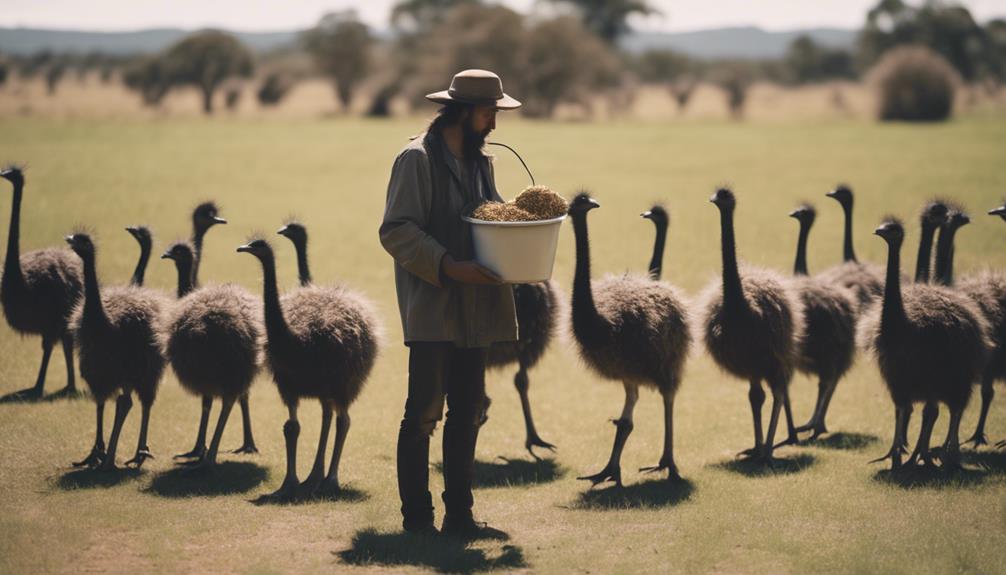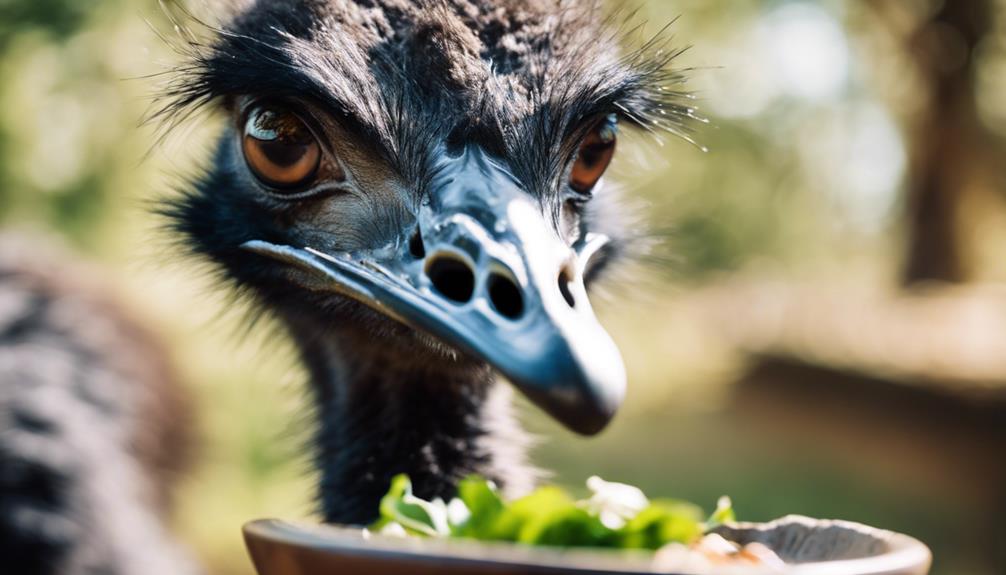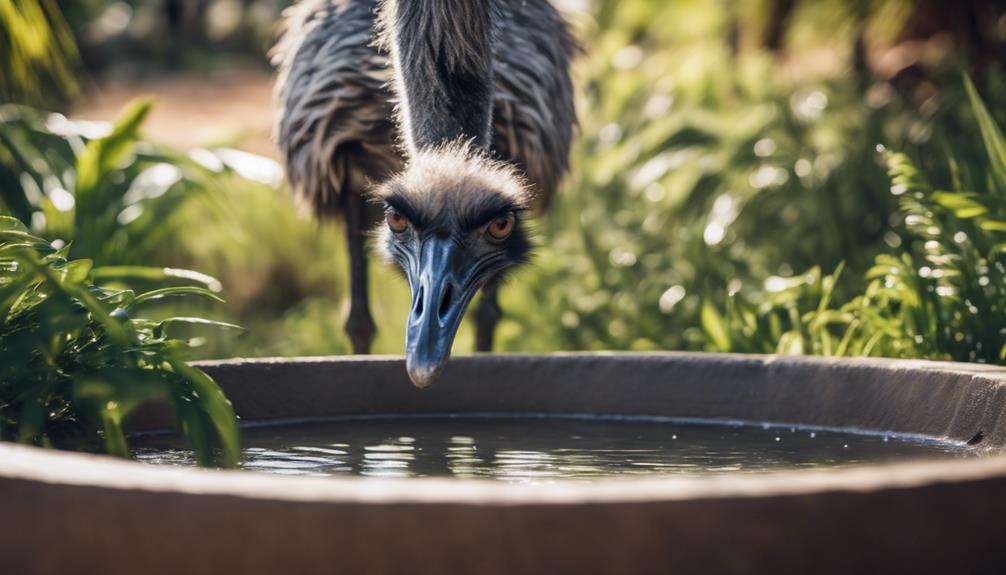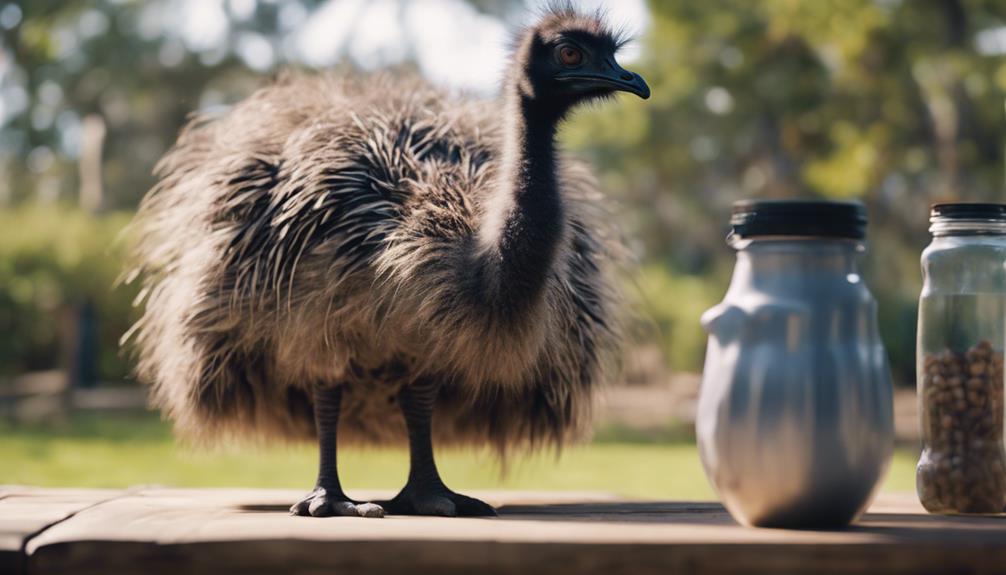
When it comes to feeding your emu, ensuring they have a well-rounded diet is key to their overall health. From understanding their specific nutritional requirements to discovering the best protein sources, there's a lot to consider. But what about the timing of their meals and potential dietary adjustments? Exploring these aspects and more can greatly impact your emu's well-being. So, let's dive into the world of emu nutrition and uncover the best practices for keeping your feathered friend healthy and happy.
Key Takeaways
- Provide high-quality emu feed, leafy greens, and protein supplements for a balanced diet.
- Ensure access to fresh fruits and mixed grains to meet nutritional needs.
- Monitor hydration levels closely, especially in hot weather.
- Consider special dietary requirements such as calcium intake and vitamin supplements.
- Consult with an avian veterinarian for tailored care and early health issue detection.
Emu Dietary Needs

To meet the nutritional requirements of your emu, ensure their diet is rich in high-quality proteins and essential vitamins and minerals. Emus are large birds with specific dietary needs that must be met to keep them healthy and thriving.
Protein is crucial for muscle development and overall growth in emus. Offer them sources of protein such as insects, worms, and specially formulated emu feed to ensure they're getting an adequate amount.
Additionally, emus require vitamins like vitamin E for their immune system and reproductive health. Make sure their diet includes vitamin-rich foods like leafy greens, fruits, and vegetables to fulfill this need.
Minerals such as calcium and phosphorus are essential for bone strength and eggshell formation in emus. Incorporate mineral supplements or provide access to mineral blocks to support these vital functions.
Understanding Nutritional Requirements
Understanding the nutritional requirements of your emu is essential for ensuring their health and well-being. Emus are large, flightless birds that have specific dietary needs to thrive. A balanced diet is crucial, consisting of high-quality emu feed, fresh water, and occasional treats like fruits and vegetables. Emus require a diet rich in protein, essential vitamins, and minerals to maintain optimal health. It's important to provide them with a diet that mimics their natural feeding habits in the wild.
When formulating your emu's diet, consider factors such as age, activity level, and overall health. Young emus have different nutritional requirements than adults, requiring higher protein levels for growth and development. Ensure that the feed you provide meets the nutritional standards set for emus, avoiding deficiencies or excesses that could harm their health. Regularly monitor your emu's weight and overall condition to adjust their diet as needed. By understanding and meeting their nutritional requirements, you can ensure that your emu remains healthy and strong.
Importance of Protein in Diet

Incorporating sufficient protein into your emu's diet is crucial for their overall health and well-being. Protein plays a vital role in muscle development, feather growth, and overall body function. Emus are large birds that require a substantial amount of protein to support their active lifestyle and unique biological needs. Ensuring that your emu receives an adequate protein intake will help maintain their energy levels, support proper feather quality, and promote overall health and vitality.
To give you a clearer picture, here is a breakdown of some protein-rich foods you can include in your emu's diet:
| Protein-Rich Foods | Protein Content per 100g | Feeding Frequency |
|---|---|---|
| Mealworms | 25g | 2-3 times a week |
| Crickets | 12g | Once a week |
| Fish | 20g | Once a week |
Sources of Essential Vitamins
Ensuring your emu's diet includes a variety of foods rich in essential vitamins is crucial for their overall health and well-being. Vitamins play a vital role in maintaining your emu's immune system, reproductive health, and overall vitality.
To meet their nutritional needs, focus on vitamin-rich foods like leafy greens such as kale and spinach, which are excellent sources of Vitamin A for vision health and immune function. Incorporating fruits like berries and citrus fruits can provide Vitamin C, essential for collagen production and immune support. Additionally, including vitamin E-rich foods like nuts and seeds can help protect your emu's cells from oxidative damage.
To ensure optimal health, consider adding vitamin D sources like fortified grains or providing access to sunlight for natural synthesis. By incorporating a variety of these vitamin-rich foods into your emu's diet, you can help them thrive and maintain robust health.
Balancing Carbohydrates and Fats

For optimal health and nutrition for your emu, striking the right balance between carbohydrates and fats in their diet is crucial. Emus are omnivores, but in the wild, their diet mainly consists of plants, insects, and small vertebrates. When feeding your emu, ensure that the carbohydrates come from high-quality sources like leafy greens, fruits, and whole grains. These carbohydrates provide essential energy for your emu's daily activities and metabolic processes.
In terms of fats, emus require healthy fats to support overall health, especially for their skin and feathers. Include sources of unsaturated fats such as nuts, seeds, and fish in their diet. These fats are vital for maintaining proper cell function and promoting a lustrous coat on your emu.
Balancing carbohydrates and fats in your emu's diet will help maintain their energy levels, support their growth and development, and keep their feathers healthy and shiny. Remember, a well-rounded diet is key to ensuring your emu's optimal health and well-being.
Feeding Frequency and Portions
To ensure your emu's optimal health and well-being, it's important to establish a consistent feeding schedule that addresses both the frequency of meals and appropriate portion sizes. Emus require a well-thought-out feeding plan to thrive.
Here are some key points to consider:
- Consistency is Key: Maintaining a regular feeding schedule helps regulate your emu's metabolism and keeps its energy levels stable.
- Portion Control: Overfeeding can lead to obesity and health issues, while underfeeding can result in nutrient deficiencies. Finding the right balance is crucial.
- Observe Behavior: Monitor your emu's eating habits and adjust portion sizes accordingly. If it consistently leaves food behind, you might be overfeeding.
- Consult an Expert: If you're unsure about the appropriate feeding frequency or portion sizes for your emu, seek advice from a professional to ensure you're providing the best care.
Hydration and Water Intake

Maintain a consistent and adequate water supply for your emu to support its hydration needs and overall health. Emus require a substantial amount of water to stay healthy and active. Ensure that your emu always has access to clean, fresh water.
Emus can drink up to two to three gallons of water per day, depending on the weather conditions and their activity level. Be vigilant in monitoring the water levels in their drinking containers, especially during hot weather or after physical exertion. Emus are sensitive to dehydration, which can lead to serious health issues.
Provide water in containers that are deep enough for them to dip their beaks and heads into comfortably. Ensure that the water isn't too cold, as emus prefer lukewarm water for drinking. By prioritizing your emu's hydration needs, you contribute significantly to its overall well-being and vitality.
Common Feeding Mistakes to Avoid
Ensure your emu's diet remains balanced and healthy by steering clear of these common feeding mistakes. To maintain the power and vitality of your emu, avoid the following missteps:
- Overfeeding: Resist the urge to overindulge your emu, as excess food can lead to obesity and health issues.
- Inadequate Fiber: Emus require a high-fiber diet to aid in digestion. Ensure they've access to suitable fiber sources.
- Neglecting Protein Needs: Emus need adequate protein for muscle development and overall health. Ensure their diet includes enough protein-rich foods.
- Ignoring Vitamin and Mineral Requirements: Emus need a variety of vitamins and minerals for optimal health. Make sure their diet is well-balanced and includes essential nutrients.
Emu Feeding Schedule Examples

When establishing an emu feeding schedule, it is crucial to consider their dietary needs and habits to promote optimal health and well-being. Emus are large birds that require a balanced diet to thrive. To help you plan your emu feeding schedule effectively, here are some examples to guide you:
| Morning | Afternoon | Evening | Night |
|---|---|---|---|
| High-quality pellets | Fresh fruits | Mixed grains | Fresh water |
| Leafy greens | Vegetables | Insects | Shelter |
| Protein supplements | Nuts | Mineral supplements | Secure fencing |
Emus should have access to clean water at all times. The morning feeding can consist of high-quality pellets and leafy greens, providing essential nutrients to start the day. In the afternoon, offer fresh fruits, vegetables, and nuts for a diverse diet. In the evening, grains and mineral supplements can be provided, along with protein supplements and insects. Ensure a secure shelter and fencing for their safety during the night. By following a well-rounded feeding schedule, you can support your emu's health and vitality.
Special Dietary Considerations
For optimal health and nutrition, it's essential to consider special dietary considerations when feeding your emu. Emus have specific dietary needs that must be met to ensure their well-being. Here are some crucial points to keep in mind:
- Protein Requirements: Emus require a diet high in protein for muscle development and overall health. Ensure their feed contains adequate protein levels to support their growth and vitality.
- Calcium Intake: Calcium is essential for bone strength and eggshell formation in emus. Incorporate sources of calcium, such as crushed oyster shells, into their diet to prevent deficiencies.
- Vitamin Supplements: Emus may benefit from vitamin supplements to meet their nutritional requirements fully. Consult with a veterinarian to determine the appropriate supplements for your emu.
- Hydration Needs: Adequate hydration is crucial for emus, especially during hot weather. Provide access to clean, fresh water at all times to keep them healthy and hydrated.
Monitoring Emu's Health Through Diet

To maintain optimal health and well-being for your emu, closely monitor their diet to ensure they're receiving the necessary nutrients for their specific needs. Emus require a balanced diet rich in protein, fiber, vitamins, and minerals to thrive. Ensure that their daily feed includes a high-quality emu pellet specifically formulated for their nutritional requirements.
Monitor their water intake, as emus need access to clean, fresh water at all times to prevent dehydration. Keep a keen eye on their body condition, as sudden weight loss or gain could indicate underlying health issues or an improper diet. Adjust their feed quantities based on their activity levels and growth stage, ensuring they're neither underfed nor overfed.
Additionally, observe their droppings for any changes in consistency or color, as this can be a sign of digestive issues. By vigilantly monitoring your emu's diet and health indicators, you empower yourself to proactively address any potential concerns and promote their overall well-being.
Consulting With an Avian Veterinarian
Consulting with an avian veterinarian is crucial for ensuring the optimal health and well-being of your emu. These professionals have the expertise necessary to provide specialized care and guidance tailored to your emu's unique needs. Here are some reasons why consulting with an avian veterinarian is essential:
- Specialized Knowledge: Avian veterinarians possess specialized knowledge about emus, their dietary requirements, common health issues, and overall well-being.
- Early Detection: Regular consultations can help in early detection of any health concerns or issues that may arise, allowing for prompt intervention and treatment.
- Preventive Care: Avian veterinarians can provide valuable advice on preventive care measures to keep your emu healthy and thriving.
- Emergency Preparedness: In case of any emergencies or sudden health issues, having a trusted avian veterinarian on call can make all the difference in ensuring the best possible outcome for your emu.
Frequently Asked Questions
Can Emus Eat Fruit as Part of Their Diet?
Yes, emus can eat fruit as part of their diet. It provides essential vitamins and minerals. However, moderation is key. Offer a variety of fruits like apples, bananas, and berries. Always ensure they have access to fresh water.
What Supplements Are Necessary for Emus?
To ensure optimal health for your emu, essential supplements like calcium, vitamin E, and selenium are necessary. Consult with a veterinarian to determine the correct dosage and frequency for your emu's specific needs.
How Can I Prevent Obesity in My Emu?
To prevent obesity in your emu, ensure a balanced diet rich in fiber and low in high-calorie treats. Limit fatty foods and monitor portion sizes. Exercise is key—emus love to roam, so provide ample space for movement.
Are There Any Foods That Are Toxic to Emus?
Avoid feeding your emu avocados, chocolate, caffeine, and alcohol, as they can be toxic to them. Stick to a diet of high-quality emu feed, fresh fruits, vegetables, and plenty of water to keep your emu healthy.
Can Emus Be Fed a Vegetarian or Vegan Diet?
You can feed emus a vegetarian or vegan diet, but it's essential to ensure they receive proper nutrients like protein and vitamins found in their natural diet. Consult with a vet for guidance.
Conclusion
Now that you have learned about the importance of feeding your emu a balanced diet rich in essential nutrients, you can ensure their health and well-being. Just like a well-oiled machine, their body functions best when fueled with the right foods.
Remember to monitor their intake, consult with a professional if needed, and enjoy watching your emu thrive on their nutritious diet. Your efforts will be rewarded with a happy and healthy feathered friend.




